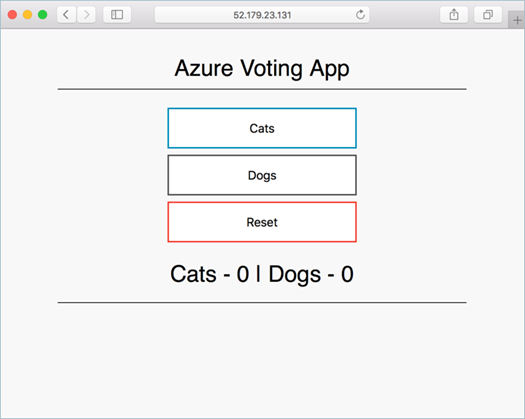在 Azure 中部署 Kubernetes 容器集群
============================================================
在这个快速入门教程中,我们使用 Azure CLI 创建一个 Kubernetes 集群,然后在集群上部署运行由 Web 前端和 Redis 实例组成的多容器应用程序。一旦部署完成,应用程序可以通过互联网访问。

这个快速入门教程假设你已经基本了解了 Kubernetes 的概念,有关 Kubernetes 的详细信息,请参阅 [Kubernetes 文档][3]。
如果您没有 Azure 账号,请在开始之前创建一个[免费帐户][4]。
### 登录 Azure 云控制台
Azure 云控制台是一个免费的 Bash shell,你可以直接在 Azure 网站上运行。它已经在你的账户中预先配置好了, 单击 [Azure 门户][5]右上角菜单上的 “Cloud Shell” 按钮;
[][6]
该按钮会启动一个交互式 shell,您可以使用它来运行本教程中的所有操作步骤。
[][7]
此快速入门教程所用的 Azure CLI 的版本最低要求为 2.0.4。如果您选择在本地安装和使用 CLI 工具,请运行 `az --version` 来检查已安装的版本。 如果您需要安装或升级请参阅[安装 Azure CLI 2.0 ][8]。
### 创建一个资源组
使用 [az group create][9] 命令创建一个资源组,一个 Azure 资源组是指 Azure 资源部署和管理的逻辑组。
以下示例在 _eastus_ 区域中创建名为 _myResourceGroup_ 的资源组。
```
az group create --name myResourceGroup --location eastus
```
输出:
```
{
"id": "/subscriptions/00000000-0000-0000-0000-000000000000/resourceGroups/myResourceGroup",
"location": "eastus",
"managedBy": null,
"name": "myResourceGroup",
"properties": {
"provisioningState": "Succeeded"
},
"tags": null
}
```
### 创建一个 Kubernetes 集群
使用 [az acs create][10] 命令在 Azure 容器服务中创建 Kubernetes 集群。 以下示例使用一个 Linux 主节点和三个 Linux 代理节点创建一个名为 _myK8sCluster_ 的集群。
```
az acs create --orchestrator-type=kubernetes --resource-group myResourceGroup --name=myK8sCluster --generate-ssh-keys
```
几分钟后,命令将完成并返回有关该集群的 json 格式的信息。
### 连接到 Kubernetes 集群
要管理 Kubernetes 群集,可以使用 Kubernetes 命令行工具 [kubectl][11]。
如果您使用 Azure CloudShell ,则已经安装了 kubectl 。如果要在本地安装,可以使用 [az acs kubernetes install-cli][12] 命令。
要配置 kubectl 连接到您的 Kubernetes 群集,请运行 [az acs kubernetes get-credentials][13] 命令下载凭据并配置 Kubernetes CLI 以使用它们。
```
az acs kubernetes get-credentials --resource-group=myResourceGroup --name=myK8sCluster
```
要验证与集群的连接,请使用 [kubectl get][14] 命令查看集群节点的列表。
```
kubectl get nodes
```
输出:
```
NAME STATUS AGE VERSION
k8s-agent-14ad53a1-0 Ready 10m v1.6.6
k8s-agent-14ad53a1-1 Ready 10m v1.6.6
k8s-agent-14ad53a1-2 Ready 10m v1.6.6
k8s-master-14ad53a1-0 Ready,SchedulingDisabled 10m v1.6.6
```
### 运行应用程序
Kubernetes 清单文件为集群定义了一个所需的状态,包括了集群中应该运行什么样的容器镜像。 对于此示例,清单用于创建运行 Azure Vote 应用程序所需的所有对象。
创建一个名为 `azure-vote.yaml` ,将下面的内容拷贝到 YAML 中。
```
apiVersion: apps/v1beta1
kind: Deployment
metadata:
name: azure-vote-back
spec:
replicas: 1
template:
metadata:
labels:
app: azure-vote-back
spec:
containers:
- name: azure-vote-back
image: redis
ports:
- containerPort: 6379
name: redis
---
apiVersion: v1
kind: Service
metadata:
name: azure-vote-back
spec:
ports:
- port: 6379
selector:
app: azure-vote-back
---
apiVersion: apps/v1beta1
kind: Deployment
metadata:
name: azure-vote-front
spec:
replicas: 1
template:
metadata:
labels:
app: azure-vote-front
spec:
containers:
- name: azure-vote-front
image: microsoft/azure-vote-front:redis-v1
ports:
- containerPort: 80
env:
- name: REDIS
value: "azure-vote-back"
---
apiVersion: v1
kind: Service
metadata:
name: azure-vote-front
spec:
type: LoadBalancer
ports:
- port: 80
selector:
app: azure-vote-front
```
使用 [kubectl create][15] 命令来运行该应用程序。
```
kubectl create -f azure-vote.yaml
```
输出:
```
deployment "azure-vote-back" created
service "azure-vote-back" created
deployment "azure-vote-front" created
service "azure-vote-front" created
```
### 测试应用程序
当应用程序的跑起来之后,需要创建一个 [Kubernetes 服务][16],将应用程序前端暴露在互联网上。 此过程可能需要几分钟才能完成。
要监控这个进程,使用 [kubectl get service][17] 命令时加上 `--watch` 参数。
```
kubectl get service azure-vote-front --watch
```
最初,_azure-vote-front_ 服务的 EXTERNAL-IP 显示为 _pending_ 。 一旦 EXTERNAL-IP 地址从 _pending_ 变成一个具体的 IP 地址,请使用 “CTRL-C” 来停止 kubectl 监视进程。
```
azure-vote-front 10.0.34.242 <pending> 80:30676/TCP 7s
azure-vote-front 10.0.34.242 52.179.23.131 80:30676/TCP 2m
```
现在你可以通过这个外网 IP 地址访问到 Azure Vote 这个应用了。

### 删除集群
当不再需要集群时,可以使用 [az group delete][18] 命令删除资源组,容器服务和所有相关资源。
```
az group delete --name myResourceGroup --yes --no-wait
```
### 获取示例代码
在这个快速入门教程中,预先创建的容器镜像已被用于部署 Kubernetes 。相关应用程序代码 Dockerfile 和 Kubernetes 清单文件可在 GitHub 中获得。Github 仓库地址是 [https://github.com/Azure-Samples/azure-voting-app-redis][19]
### 下一步
在这个快速入门教程中,您部署了一个 Kubernetes 集群,并部署了一个多容器应用程序。
要了解有关 Azure 容器服务的更多信息,走完一个完整的从代码到部署的全流程,请继续阅读 Kubernetes 集群教程。
--------------------------------------------------------------------------------
via: https://docs.microsoft.com/en-us/azure/container-service/kubernetes/container-service-kubernetes-walkthrough
作者:[neilpeterson][a],[mmacy][b]
译者:[rieonke](https://github.com/rieonke)
校对:[wxy](https://github.com/wxy)
本文由 [LCTT](https://github.com/LCTT/TranslateProject) 原创编译,[Linux中国](https://linux.cn/) 荣誉推出
[a]:https://github.com/neilpeterson
[b]:https://github.com/mmacy
[1]:https://github.com/neilpeterson
[2]:https://github.com/mmacy
[3]:https://kubernetes.io/docs/home/
[4]:https://azure.microsoft.com/free/?WT.mc_id=A261C142F
[5]:https://portal.azure.com/
[6]:https://portal.azure.com/
[7]:https://portal.azure.com/
[8]:https://docs.microsoft.com/en-us/cli/azure/install-azure-cli
[9]:https://docs.microsoft.com/en-us/cli/azure/group#create
[10]:https://docs.microsoft.com/en-us/cli/azure/acs#create
[11]:https://kubernetes.io/docs/user-guide/kubectl/
[12]:https://docs.microsoft.com/en-us/cli/azure/acs/kubernetes#install-cli
[13]:https://docs.microsoft.com/en-us/cli/azure/acs/kubernetes#get-credentials
[14]:https://kubernetes.io/docs/user-guide/kubectl/v1.6/#get
[15]:https://kubernetes.io/docs/user-guide/kubectl/v1.6/#create
[16]:https://kubernetes.io/docs/concepts/services-networking/service/
[17]:https://kubernetes.io/docs/user-guide/kubectl/v1.6/#get
[18]:https://docs.microsoft.com/en-us/cli/azure/group#delete
[19]:https://github.com/Azure-Samples/azure-voting-app-redis.git